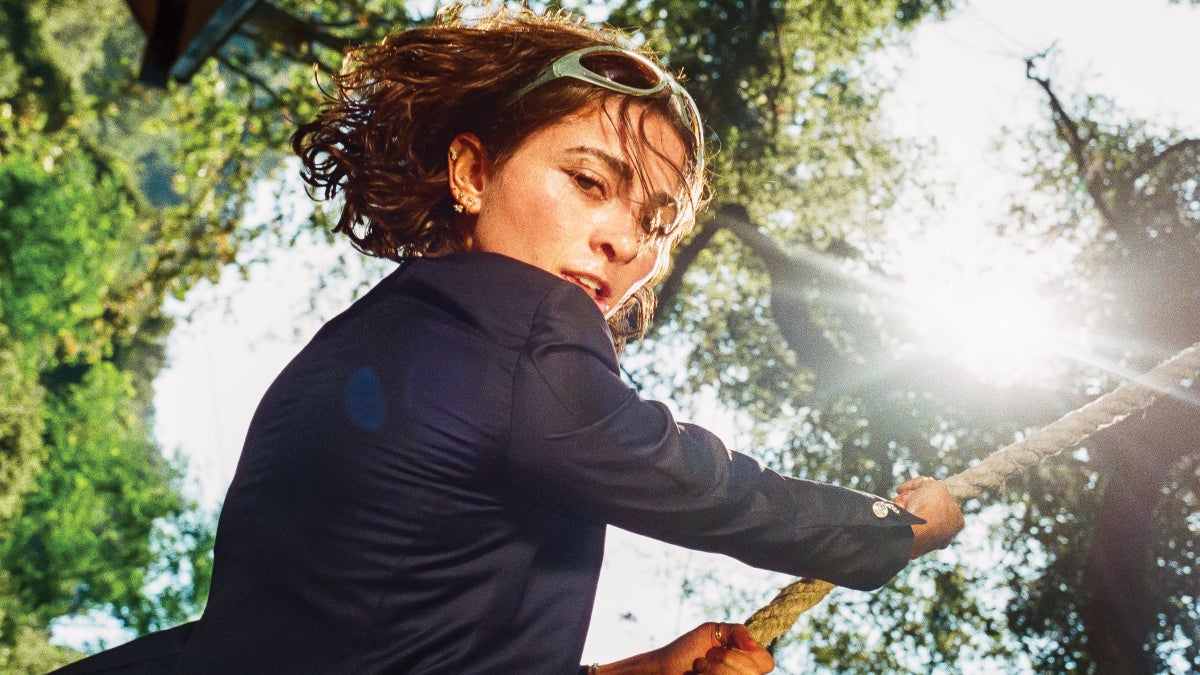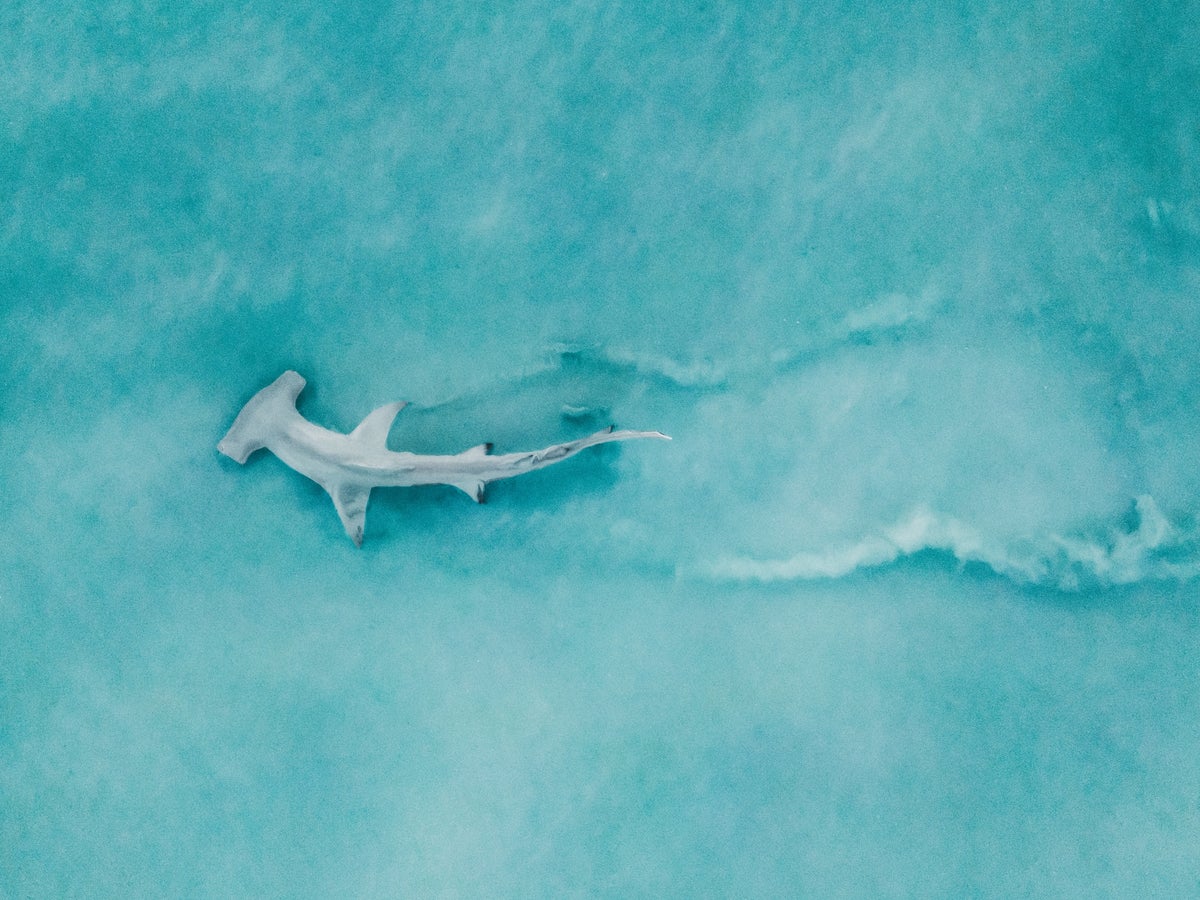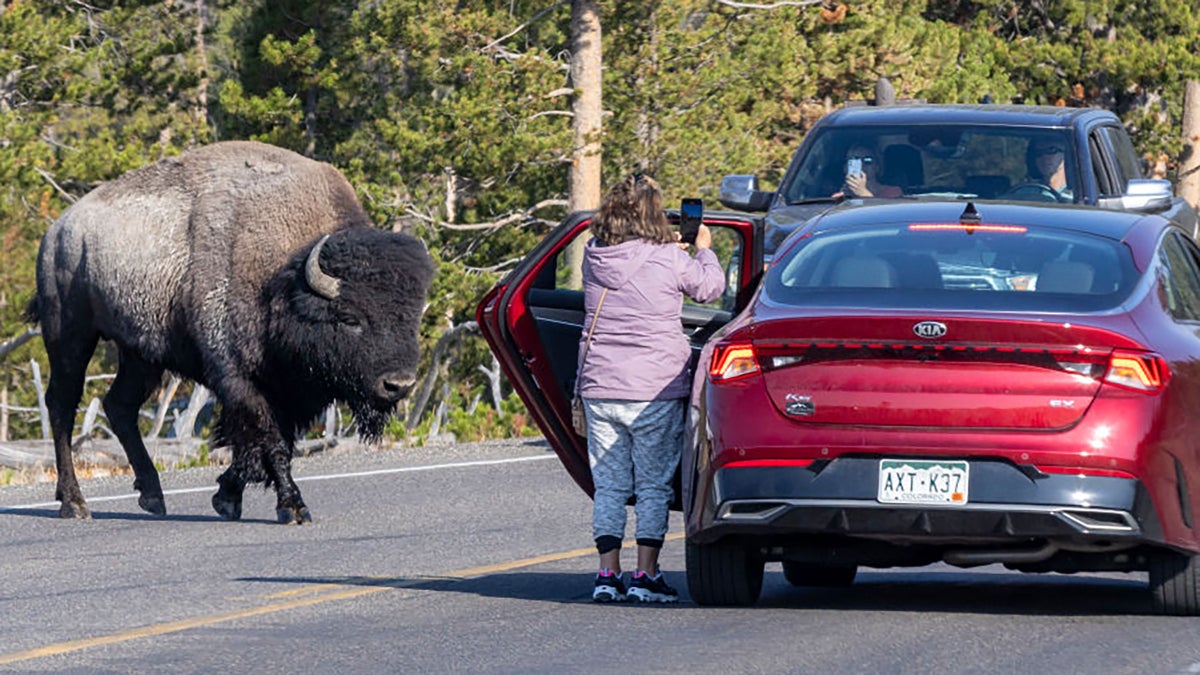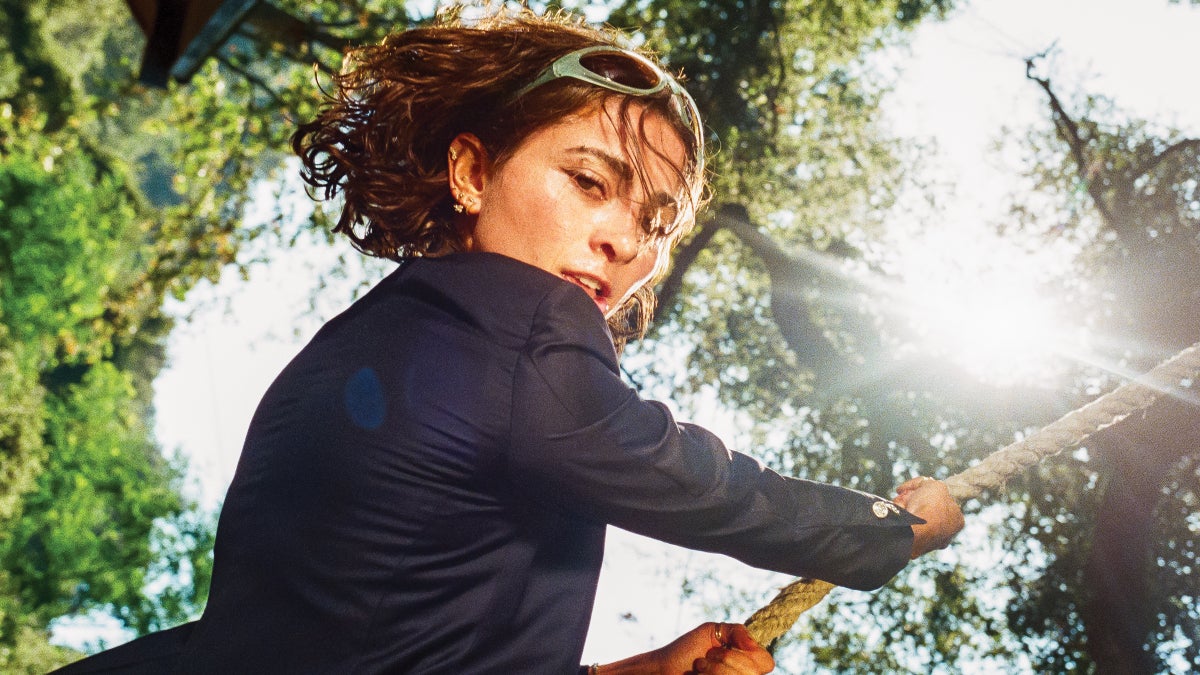
On the first Sunday of November 2021, I was standing where I always stand: on a street corner on Fourth Avenue in Brooklyn, waiting to cheer on the New York City Marathon runners, especially the pro women. In New York, the women’s race is special. Athletes start a half hour before the rest of the field. It means that they have the streets—and the spotlight—all to themselves to showcase their talents. To compete.
The first wave made their way down the wide avenue in a blur, and my head swiveled back and forth, trying to track each runner in the lead group and the chase pack that followed shortly after. A few minutes later, I saw someone moving alone. I realized that it was Alexi Pappas, the Olympian and pro runner on the track, roads, and trails, and I was worried. I knew she was supposed to compete, but when I didn’t see her with the other elite women, I assumed she didn’t start the race. I had heard something about an injury, but I didn’t know the details. Was she OK?
As she drew closer, I saw that she was OK. She was more than OK. She was dancing through the open street, blowing kisses to the crowd, something I later learned that she did for the entire 26.2 miles. She wore glitter and sparkled like something ethereal.
Some might have written this off as a stunt. A performance. A ploy for attention. But to see it firsthand, it was anything but that. I don’t know how to describe it except that it was pure joy. It moved me so much that I responded to Alexi’s Instagram story later that day to thank her for showing up fully and uniquely herself.
Years later, I still think about that experience.
In this era of social media and digital everything, the adage is to “be authentic.” But it’s easy to conflate authenticity with popularity and virality, especially in spaces where algorithms drive everything that we see. Over time, we lose touch with what we think, how we feel, and what our gut tells us.
With Pappas, the opposite seems to be true. She’s become more real—more Alexi—over the years. There’s a sense that she’s fully grounded and present in every decision she makes. Maybe it’s because she’s experienced a pretty full range of life already. She’s lost a parent. She’s competed at the Olympics. She’s broken national records. She’s experienced high-risk depression and serious injuries and recovered from them. She’s written, starred in, and directed movies. She’s published a memoir, Bravey, about her journey through life and sport. She’s been married. She’s gone through a divorce. She runs races with the producer and DJ Diplo.
Pappas is one of the rare athletes who has cultivated longevity in sport by expanding, rather than siloing, herself. She has nourished a vibrant running and creative life, one that’s rooted equally in her priorities and values as well as her curiosity. As she describes it, she pursues the things she has a “crush on.” A week in her life might include a premiere for a movie that she wrote, directed, produced, and acted in; a photoshoot; a Hyrox competition; drafting a chapter for a new book; prep for a podcast interview; therapy; and—of course—a trail run.
But first, there’s Alexi.
Outside talked to Pappas to understand how she maintains her authenticity as an athlete, artist, director, writer, and creative. (By the way, she hates these labels.)
Editor’s note: This Q&A includes and references ideas Pappas wrote for us prior to the interview. Pappas’s writing is noted with a yellow asterisk. This interview has been lightly edited for clarity and brevity.

OUTSIDE: I vividly remember watching you run the 2021 New York City Marathon. It was the first time you wore glitter during a race, and in your ideas you shared with us ahead of this conversation, you described it as “an entirely self-protective choice.” You had major surgery on your hamstring nine months prior, and while you were healthy enough to run, you weren’t ready to race. Can you tell me more about that choice to don an armor of glitter?
Alexi Pappas: I had never done this before—toeing the start line with the elites, 30 minutes ahead of everyone else, knowing that you are going to be out the back right from the very start. I didn’t know how I was going to move through the course before the gun went off. I just knew that this glitter could communicate to people that I was OK, that I was empowered, and that this was an intentional act.
You chose to dance through the street, and you looked so joyful.
Alexi: In running, a lot of the time, you’re pushing away the present for a later joy. You might even have tunnel vision and ignore things. In this case, I really tapped into being present, and I realized that this was just an open road with happy people standing on the side. I had this expansive feeling inside me that I wanted to move differently and take up the space differently.
Deep down, I’m just a theater kid who wanted to be on Broadway. I made very specific eye contact with people, blew them real kisses, and gave them love and received love back. It was quite emotional. It felt like a true exchange between strangers of energy that I could uniquely do because I was not out there racing, as I normally am and as most people are when they run the New York City Marathon.
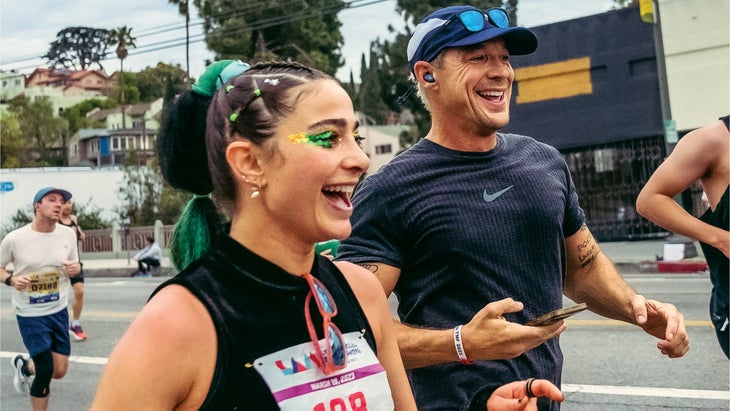
You wrote, “In sports, we make meaning. In turn, we find meaning.” It sounds like you made meaning from this experience.
Alexi: These things are hard, you know? Before something’s cool, it’s just different and that’s the scariest part. I was afraid there might be consequences for what I was doing and that the race organizers were going to pull me off the course.
How does running feed your creative process and vice versa?
Alexi: There are no slam dunks in running, but there’s a playfulness and mischievous intensity, and it’s the same with writing. I love how one word can mean so many things to people, how you can layer a line under it, and it changes the meaning of that word. I love whipping words around like a lasso, like it’s an athletic thing.
I feel like myself when I’m running. There’s no way I’m not in a better mood after I get back from my trail run than I was before running. I have the best conversations, the best views, the best shower after because I’m so covered in dust and I’m moving with my body.
It just takes a long time for me to get to that fitness place where I can feel most myself. It’s why I’m getting in shape for the first time since the Olympics, because I know there’s an expression of me inside that can be best expressed when I’m able to do more with my body.
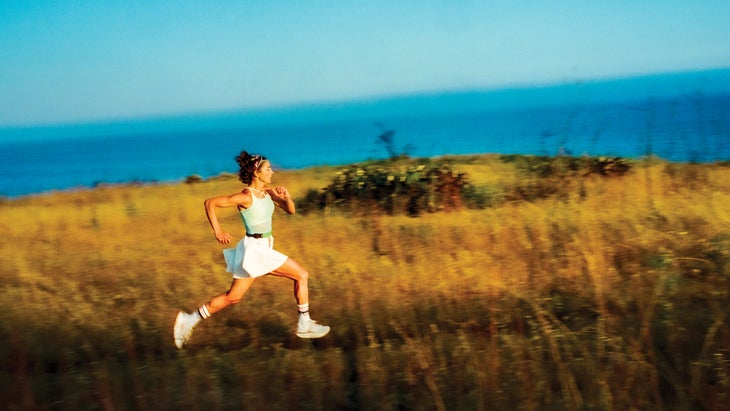
We seem to be in a moment where art, culture, and running all intersect, and where running isn’t nerdy anymore. What do you make of it?
Alexi: Expression isn’t baked into the rules of the sport or its metrics. If you look at sports where you’re judged, like figure skating or synchronized swimming, the way you express is inextricably linked with your performance. In running, you can express yourself in any way, and it has nothing to do with your performance; and therefore, it has the most freedom.
I think what we’re realizing is that it doesn’t matter, which means running has all the potential in the world to have meaning that is unique to each of us. Because there’s no medal given for wearing glitter. You have to cross the finish line, but you can wear glitter and cross the finish line. It’s this amazing space where anything is possible and allowed, as long as you just keep moving toward that finish line.
There are a lot of people who now wear glitter when they run. How does that make you feel when you see that?
Alexi: I feel happy that I’m seeing people take up space and make choices for themselves that feel good. People might not even know who I am or where this trend comes from. They don’t need to. But I know that if something comes from me in any derivative way, it comes from a real place. I don’t do things without meaning, even if I don’t always understand the meaning when I’m doing it.
How do you decide what interests to lean into?
Alexi: I think I’m a plant. Plants don’t just grow every leaf and every flower all at once. They grow a stem, then a branch, then another. It’s a process. So, I’m in touch with which part of myself, as a plant, feels most able, abundant, and expanded to grow.
For example, in high school, I was growing as a person in sports, theater, and student government. I was having crushes on boys and sneaking out at night. Running wasn’t meant to grow at that time. When I went to college, I leaned into running then because the environment was right. It was different from high school. It felt right.
But it’s this plant mentality combined with an understanding of my priorities. There’s always a North Star. When I’m training at the highest level, running comes first. I’m not going to pull an all-nighter, even if I’m working on a movie project at the same time. It’s understanding where the North Star is and listening to where I have the potential to grow and expand without forcing it. I see a lot of runners sign up for the marathon when they don’t even feel like running. Maybe there’s a different branch or a little berry you could be growing right now instead.
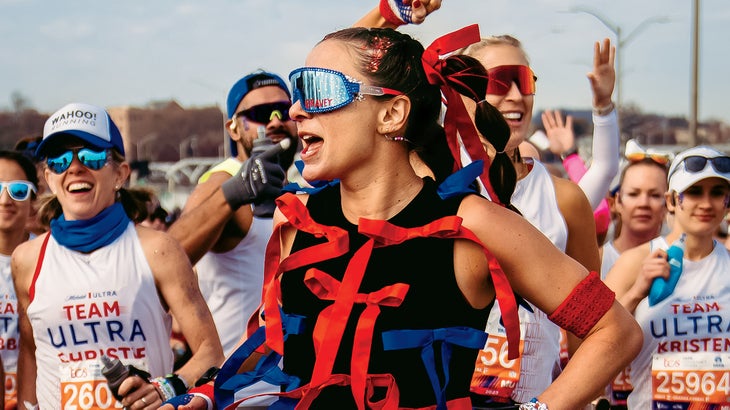
What advice do you have for people, especially young people, about how to figure out which stem or branch to lean into?
Alexi: You’re here to give yourself the chance to brave the unknown. That’s kind of how I see a lot of the things I’m doing in my life. I don’t really know where they’re going, but I know I’m making my best decisions. I know that when I get in there, I want to experience it, because that is my privilege here on this earth, to try and to have these experiences.
And trying is part of the experience. It’s like going on a roller coaster. You don’t want to go to the theme park and not ride the rides. You don’t want to just put a fan on your face to imitate a roller coaster. Don’t you want to be on the real roller coaster and not the simulation? I might not want to get on that roller coaster again. Or I might want to ride that one again or go to a different theme park.
So I’d tell them to try the thing that you’re actually drawn to. You don’t have to try every roller coaster, but the ones you try, try them for the right reasons. Because what’s the fear? That someone’s going to make fun of you for riding a roller coaster? It’s only uncool if we collectively make it uncool. We can just change our minds and say this is awesome. But also, who cares? You’re riding it, and that’s all that really matters.
You’ve written about how your mom’s death made you realize that no one was going to save you or your life except you. Instead of closing yourself off and trying to control everything, you chose to open up and trust yourself. Can you tell me about that choice?
Alexi: I did feel it was unfair growing up. Every time I saw myself do something on my own, it hurt. I was sad because I felt like everybody around me got taken care of in a way different than me. It sucked to feel like I had this burden that other people didn’t have.
But I allowed myself the permission to do what I wanted to do. I realized that me being myself is not just OK. It’s more than OK. It’s welcomed and celebrated. I wasn’t cool yet for being different then, and sometimes it takes the world a second to catch up.
I would survive by counting on myself, which, to me, means trusting and leaning all the way into myself. There was no other option, no backup. So, whatever marbled swirling universe that breathes, billows, and spirals inside me, conjuring up my words, ideas, outfits, actions, strength, tears, and love … that infinite reservoir is the one I counted on, then, and forever still.
How did you learn that sports were a place to make and find meaning?
Alexi: I’ve written about my childhood and losing my mom when I was four. Growing up, I knew what life and death really meant. I faced that at a very young age, and I knew that sports weren’t that. I knew they were a game.
And yet, we commit to them as if they are life or death, and at the same time, we know it’s not. It’s a magical way to engage. In those circumstances, you find what’s important to you. You find who you are. You can face your fears and see how strong you are. You can look your vulnerabilities in the eye and dance with them. That’s what finding meaning is.
I think that gave me a competitive edge, too. When I’m on the start line, I’m a competitor. I could be so many other places—directing a movie, writing a book, with my cats—but I made the choice to toe a start line.
You’re often described as a “multi-hyphenate,” but you don’t like all the labels. Can you talk more about your evolving relationship with labels?
Alexi: As a kid, I didn’t know how to imitate other people. I wasn’t good at that. I knew I didn’t move like other people. I was this tomboy, jock, hyper, girlie creature.
When I came to Hollywood, I thought I would need to completely abandon my athletic identity, title, and status, that I would need to hide it in order to be in the artistic world. What I’ve learned is that it’s totally the opposite. Everything that makes us us is what makes us unique and gives us a point of view to do everything else. Bringing my full self to what I do is what has made me successful. We are cumulative creatures, and that combination is what makes us electric.
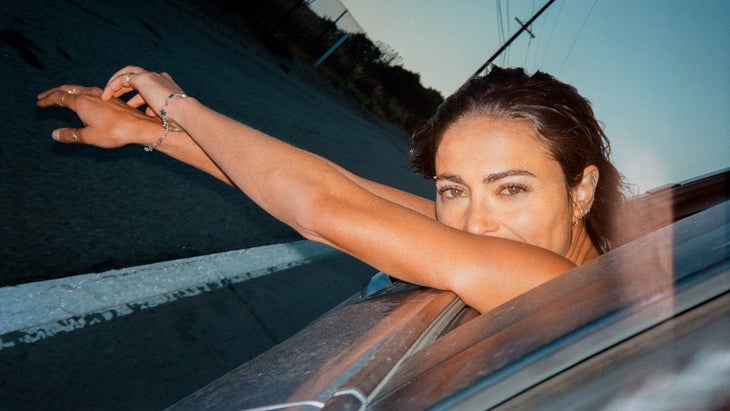
With Merrell, my athletic clothing and shoe sponsor, I’m competing competitively, but I also directed a Vogue commercial and my own photoshoot. I’ve coached Merrell employees, and I have a creative check-in with them where I collaborate on ideas for campaigns.
This multi-hyphenate approach to partnership is making me a better athlete: I believe more in myself on the start line, and I know they want all of me. I’ve never heard of a partnership like this. It’s different, and it could be how people embrace modern athletes.
I wish I was told that a long time ago, because I really tried to silo myself. I’m proud of being a director and being a writer and being an Olympian. I am really proud of these things, so I can own them. But I really, really like being Alexi.
Writer, Olympian, actor, mental health advocate, producer, director … the list exhausts and annoys me. Just call me Alexi. What I do is not who I am; it’s just what I do. I am happy and fulfilled, and my identity feels securely situated in my name, not the titles that come with my accomplishments and dreams chased.
Why did you think that you would have to abandon your athletic identity?
Alexi: I went to the Sundance labs when I was training for the Olympics, and nobody looked like me. I secretly left a party to do a run by myself and then came back to the party. I didn’t tell anyone because people were drinking and partying, and I wanted to be Hollywood cool, too, but I needed to train.
I didn’t see people like me until I started to be myself. Lesley Paterson, my co-writer on one of the shows I’m developing, is an Oscar-nominated writer for All Quiet on the Western Front and a world-class triathlete. She used her race winnings to purchase the rights to the book. I went to London to write with her. We went running in the morning, and then we wrote all day. It was a dream.
I’m starting to see how the athletic mentality really helps you in the arts. You’re reliable and know how to work on teams and work toward a common goal. You know that losing is not a loss but a step in a bigger win.
The post How Alexi Pappas Found Freedom in Embracing Every Side of Herself appeared first on Outside Online.











